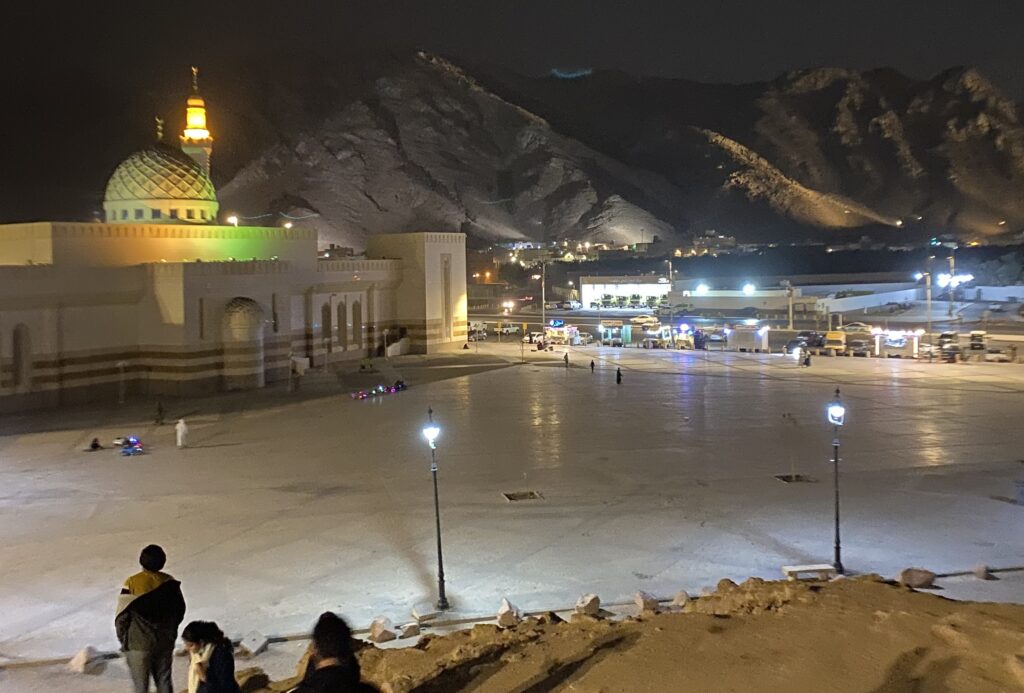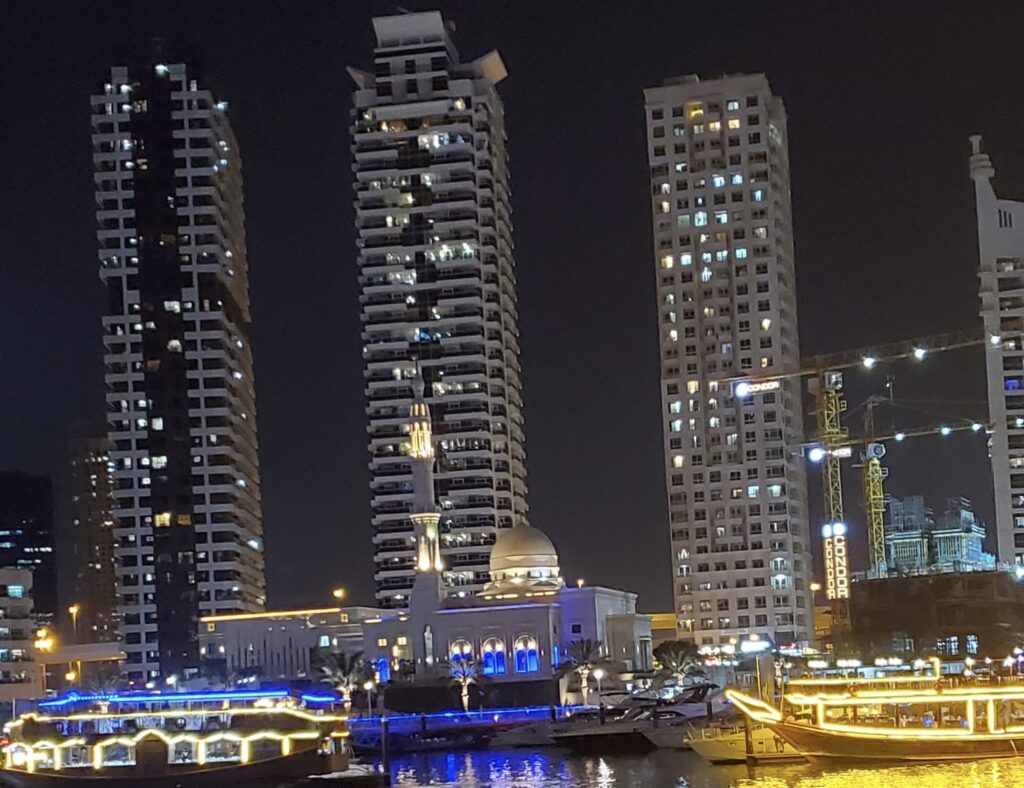Erica Wedgbury
Ridah Arshad shares her personal experience of travelling to Saudi Arabia during the pandemic.
Ridah Arshad woke up to the piercing sound of her alarm. Her phone read 12:15 a.m. From inside her bedroom, she could hear her family frantically trying to pack for their 4 a.m. flight. The airport was only about an hour away but Ridah’s family had always been last-minute packers. After she finished packing, Ridah made her way downstairs, inhaling the scent of freshly brewed coffee lingering in the kitchen. Before she could grab a cup, her father informed her that they had to leave now, or they may miss their flight. Ridah piled into the car with her parents and three siblings. As they began to drive away, Ridah turned around for one last look at her house as her stomach grew uneasy.
Sixteen-year-old Ridah and her family were on their way to Saudi Arabia to participate in the Umrah Pilgrimage. This was a last-minute trip that had been planned in December of 2021, less than a month in advance. Ridah was hesitant to travel during the pandemic, especially with the new Omicron variant, but this religious ceremony was important to her mother. Despite Ridah and her siblings’ vigorous attempts to convince their mother that travel was not safe now, flights and hotels were booked. Soon the family would be arriving in a country where COVID-19 cases were almost doubling every day.
The doubling of cases has been a confusing trend since the beginning of the pandemic in 2020, which has created a lot of misinformation surrounding COVID-19 online. According to Statistics Canada, 40 per cent of individuals who have come into contact with COVID-19 misinformation believed that what they were reading was true. As time goes on, online myths regarding the pandemic have remained present, leaving several people confused about local protocols. Due to there being no clear answers, many would continue to find themselves defying government recommendations.
“There were so many documents that we had to provide at every station such as proof of vaccination and negative PCR tests. This made the airports hectic,” said Ridah.
Once the family had arrived in Saudi Arabia, Ridah wearyingly stepped off the plane at King Khalid National Airport. She and her family headed towards customs but were met with some unpleasant news. They were not allowed to enter the country because their PCR tests were now older than 24 hours and no longer valid.
“I was so worried that we were going to be sent straight back home and all of this traveling would have been for nothing,” said Ridah, placing her head in her hands.
Audio clip of Ridah Arshad discussing her anxiety surrounding traveling during the pandemic on Feb. 17, 2022. (RSJ/ Erica Wedgbury)
Luckily, just before Ridah could begin to panic, the customs officer allowed them to take a rapid COVID-19 test right there in the airport.
It was not surprising that Ridah’s family was experiencing so much stress and confusion as Michelle Henry, a Customs Officer at Toronto Pearson Airport explains, “during the Omicron pandemic, airports were only allowing people to travel for work and funerals.”
“Anybody wanting to travel for personal reasons such as family or public events would automatically be investigated. However, most countries were a lot more lenient when it came to people leaving the country over those trying to enter.”
After presenting their negative COVID-19 tests, Ridah and her family were finally granted entrance into the country and they spent the following four days attending the Umrah Pilgrimage ceremony. Umrah is an Islamic prayer ceremony with the purpose of cleansing the soul of past sins. Although the ceremony had COVID-19 protocols effective, by the second day Ridah became very sick. She spent the rest of the trip back at their hotel in bed, struggling to do basic tasks such as eating or walking around. Ridah had now convinced herself that she had contracted the virus, however, after having taken a test, her results came back negative. Since she was not infectious, Ridah’s parents booked flights to Dubai so that they could go and visit family.
As they arrived in Dubai, Ridah was barely able to keep her eyes open. She struggled to walk off the plane as she was weak at the knees. As soon as they got to Ridah’s aunt’s apartment, she fell asleep right away. She was awoken a few hours later by the feeling of someone shaking her. Her mother was complaining about how she had slept through lunch and that she was not going to let her miss dinner too. Still half asleep, Ridah pleaded with her mother to let her stay in bed. Her mother showed no sympathy and said that she should be enjoying the trip that they had paid for.
“I felt so conflicted. On the one hand, I wanted to make my mom happy, but I also felt angry toward her. I had tried to warn her that someone was going to catch the virus, and now that I did, I look like the bad guy,” said Ridah.
Despite wanting to stay in bed, Ridah powered through the following days. She didn’t want to disappoint her parents, as they had spent a lot of money on the trip to ensure that they had a good time. Therefore, she got up each morning and partook in all of their sightseeing activities without complaint.
Finally, it was their last day in Dubai and Ridah had just arrived at the airport. She was now feeling a lot better and was ready to go home. They headed towards the PCR testing center just outside of the airport as they were not allowed to fly home without negative results.
Once Ridah received her results she froze. Her test read positive, but the rest of her family was negative. Before she could begin to comprehend what this meant, airport officers escorted her to an isolated hotel while the rest of her family were forced to fly home because their travel visas were going to expire.
The thought of being without her parents made her feel sick. It reminded her of the time she got lost in a shopping mall when she was six. She had somehow gotten separated from her father and was frantically running up and down the aisles trying to find him. Despite her father having found her in less than five minutes of being separated, she never forgot the scary afternoon and the anxiety she endured. Now, she was experiencing those same feelings over 10 years later except this time she couldn’t rely on anyone else. She was alone in a foreign country and her father was now halfway across the world.
“Once someone travels outside of Canada, they become subject to the laws of whichever country they are now in,” said the Ontario Ministry of Health.
“There is only so much the Ministry can do to aid Canadians once they are overseas. Therefore, we strongly recommend following government guidelines when it comes to traveling during the pandemic. We only recommend necessary travel which does not include religious ceremonies of any kind.”
Ridah spent the next 10 days quarantined alone in a rented apartment, only keeping in touch with her family over video calls. Once she had tested negative for COVID-19 she was allowed to fly back to Canada.
“I’m honestly surprised that I made it home safely. I had no idea where to go at the airport and I kept walking down the wrong hallways. It was really stressful,” Ridah recalled.
Once she got home, all she wanted to do was fall asleep in her bed as she was exhausted. Walking into her front door she felt a sense of relief. She thought back to the day they left and the feeling of anxiety that she couldn’t explain.
“Who would have known that the sinking feeling inside me was a sign,” said Ridah laughing.
“I just wish we had done some more research to know what we were getting ourselves into. Maybe all of this could have just been avoided.”





